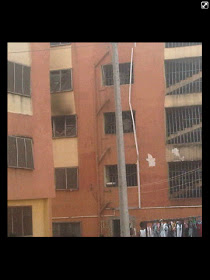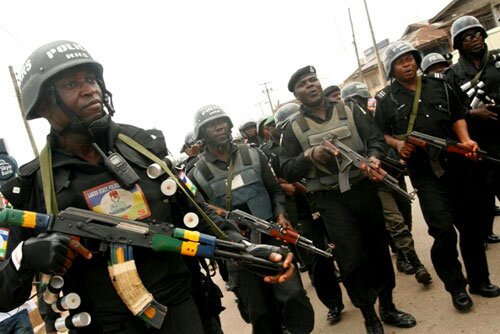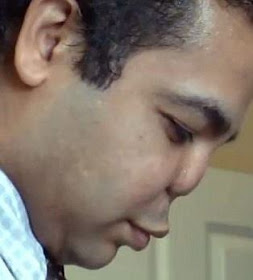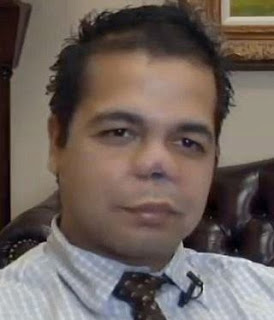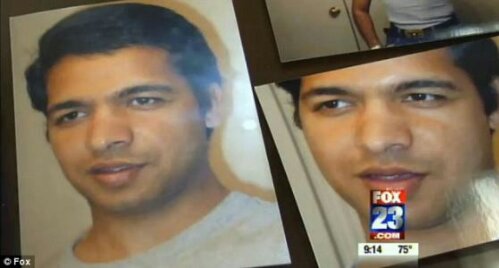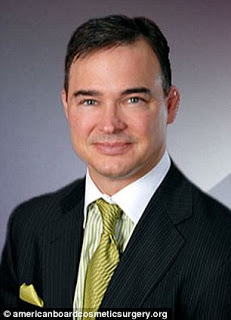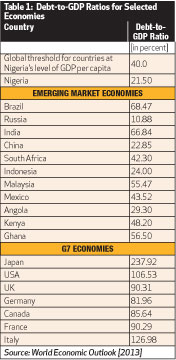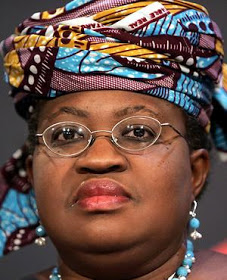It was all fun and glitz last Saturday as Lagos socialite Amaka Ogbuji tied the knots with the man of her dreams Alex at the La’ Real hotel in VGC. In an interview with thespianamber, the beautiful and excited bride described her would be marriage as God ordained… “It was love at first sight with Alex…the moment I saw his picture, I knew he was the one!” More pics below!
Socialite Amaka Clara Ogbuji Weds!!!
Posted: February 28, 2015 in UncategorizedTags: amaka ogbuji, bellanaijaweddings, wedding
Hello dear readers…it’s been a while. I stopped posting stuff for a while mainly because I got caught up with work…life & so on but guess what? I am back and better. As you would have noticed by now, the blog bears a different name…that’s me rebranding! lol. So let’s do this once more!
NB: Hope y’all have your voters card cos elections are by the corner and I don’t expect any of you sitting on the sidelines. We gotta make the change we so desperately desire!!!
It has been reported that Saint peters hostel in Okija campus of madonna university burnt with three students in a room. A Student Hall representative also sustained injuries in the incident but no death has been reported. families should contact their wards in the schools to ensure their wellbeing.
“The plot feels like an excuse”: The New York Times is not impressed with Chimamanda’s ‘Americanah
Posted: June 8, 2013 in UncategorizedTags: Americanah, Chimamanda Adichie, new York times
When readers of “Americanah” first meet its Nigerian-born heroine, Ifemelu, she has come a long way in life. She holds a fellowship at Princeton. She is “the absolute love of my life” to the man she is dating, a black American named Blaine, who teaches at Yale. She writes a blog about racial issues that features her “irreverent, hectoring, funny and thought-provoking voice,” as one online admirer puts it, though readers of “Americanah” may find it more leaden. And she has an old flame in Nigeria, Obinze, who has never gotten over her.
But Ifemelu is dissatisfied. And Chimamanda Ngozi Adichie, the immensely talented author of “Half of a Yellow Sun,” uses everyday issues to highlight her heroine’s resentments. However prestigious her career at Princeton, Ifemelu must travel to less-elite Trenton to have her hair braided — and she cares about hair so much that it is arguably this book’s second-biggest focal point. The complex balance of rational and national identities is its first and foremost concern.
At the Trenton salon, she is tended to by women from Mali and Senegal with whom she is perhaps supposed to feel a Pan-African kinship. But Ifemelu, like Ms. Adichie, bristles at facile generalizations. And she knows as much about splitting hair as she does about styling it. Though “Americanah” takes the shape of a long, star-crossed love story between Ifemelu and Obinze, it is most memorable for its fine-tuned, scathing observations about worldly Nigerians and the ways they create new identities out of pretension and aspiration.
“Half of a Yellow Sun” was just as fine-tuned. But it played out against the backdrop of the Biafran war, with a stark clarity that automatically gave it gravitas. “Americanah” is less authoritative, because its stakes are lower and because Ifemelu’s sharp opinions are not accompanied by a strong, aggressive personality. She drifts passively through a long, winding story. And “Americanah” comes dangerously close to the “exaggerated histrionics” and “improbable plots” that she ascribes to Nigerian, or Nollywood, films.
Once it establishes what Ifemelu’s life in America has become, “Americanah” flashes back to the story of how she left her homeland. And Ms. Adichie’s greatest writerly strength lies in the acuity of her descriptions. She writes of a Lagos filled with climbers, debating the merits of American affectations versus English ones for their children, gravitating to those who hold enough power to dispense favors. Ifemelu’s Aunty Uju enjoys a cozy setup as a general’s pampered mistress until she loses his protection and must flee to America for her life.
We hear Nigerian students acquiring snippets of American culture, arguing about pronunciation (should the first syllable of schedule sound like sked or shed?) and declaring their tastes in fiction. Naturally, Ms. Adichie has a withering eye for the kind of person who cares only about a book’s quota of big words.
And we see the economic consequences of brooking authority: Ifemelu’s father is fired for refusing to call his female boss “Mummy,” no matter how absurd that demand sounds. But even as her parents’ fortunes decline, Ifemelu finds a seemingly ecstatic bond with Obinze. She calls him “Ceiling” because when they make love, she is too transported to see the ceiling before her eyes.
But Ifemelu is not cut out for contentment. “Sometimes she worried that she was too happy,” the book says of these early, lovestruck days. “She would sink into moodiness, and snap at Obinze, or be distant. And her joy would become a restless thing, flapping its wings inside her, as though looking for an opening to fly away.”
Such flapping does not really endear Ifemelu to anybody, although she has a seemingly irresistible allure for African, American and African-American men. But when frustration with the Nigerian educational system and its campus strikes prompts her to go overseas, the book gets a hefty new infusion of topics for cultural critique. She struggles hard to make her way, and the book effectively dramatizes her economic plight; at one point she is all but driven to prostitution. But even in her bleakest moments, Ifemelu is astute about the new attitudes she encounters. “America’s tribalisms — race, ideology and region — became clear,” Ms. Adichie writes. “And she was consoled by her new knowledge.”
The blog bursts out of her, terrible name and all. It is called “Raceteenth or Various Observations About American Blacks (Those Formerly Known as Negroes) by a Non-American Black.” And the blog, like this book, is unafraid to take on taboo subjects, from the misguided reverence that some American blacks may hold for Mother Africa to the aforementioned obsession with how black women’s hair ought to be treated. Ifemelu puts herself through all sorts of chemical misery, watches a white girl come into a salon wanting Bo Derek’s cornrows, discovers that hair and employability are related, and even ponders the meaning of the Obamas’ sartorial and tonsorial styles.
More dramatically, “Americanah” takes Obinze to London, where he does the lowest menial work, tries to enter into a sham marriage to an Englishwoman and watches Nigerian friends show off in ridiculously upscale British ways. One of the book’s most funnily barbed moments involves “the voodoo of fine dining” to which Obinze is subjected by a friend’s largess. (Obinze’s burger arrives in a martini glass, to the sound of his host’s crowing.) But Obinze’s life abroad turns disastrous, and he must go back to Nigeria to find his way.
The first half of “Americanah” (the title refers to the newly Americanized Ifemelu) is tough-minded and clear. But Ms. Adichie disappointingly allows her story to slip to the level of a simple romance, leaving her readers to wonder, not very much, whether Ifemelu and Obinze will be reunited. The plot ultimately feels like an excuse for the venting of opinions — and the opinions carry far more conviction than the storytelling does.
Ms. Adichie displays much keen critical intelligence about how we can unwittingly betray our truest selves. But if she has any real passion for the people in “Americanah,” she’s done far too good a job of keeping it to herself.
New York times
Police In Show Of Force In Abia State Over MASSOB Sit-at-home Order
Posted: June 8, 2013 in UncategorizedTags: MASSOB
The Abia police command on Friday deployed its officers and men to parts of Abia in a show-of-force to demonstrate its readiness to quell any lawless acts on Saturday.
The team, comprising mainly of mobile policemen and women, drove round Umuahia and other areas in trucks, chanting songs.
The Movement for the Actualization of the Sovereign State of Biafra (MASSOB) had issued a sit-at-home order for Saturday to members of the public in the defunct eastern region.
The command’s spokesman, Geoffrey Ogbonna, explained that the command was poised to forestall any act that could threaten the peace and security of the state.
Mr. Ogbonna said that the show-of-force was also carried out in Aba, the economic hub of the state, as well as other major towns and villages.
He called on members of the public to disregard the MASSOB order and to go about their lawful businesses without any fear of molestation.
“We are on top of the situation,” he said, adding that officers and men of the command were on red alert and keeping 24-hour surveillance in all the nooks and crannies of Abia.
“The command warns MASSOB and any other group that would engage in any act capable of breaching the peace to stir clear as anyone caught would be made to face the full wrath of the law,” Mr. Ogbonna said.
Also speaking on the MASSOB order, the Special Adviser to Governor Theodore Orji on Security, Chris Osondu, described the agitation by the group as “unrealistic”.
Mr. Osondu advised the leadership of the group to work toward the unity and development of the country rather than dissipate its energy and resources pursuing an obsolete and unrealistic project. He urged residents of the state, market men and women, as well as shop owners to disregard the order and open for business on Saturday.
He gave the assurance that security agencies in the state would be alert to deal with any acts of lawlessness and criminality.
(NAN)
Kanye West Is Set To Move In With Kim Kardashian?
Posted: June 8, 2013 in UncategorizedTags: Kanye West, Kim Kardashian
If TV reality star Kim Kardashian seems ready to tolerate living with a man under one roof, then that would obviously be no other than Kanye West.
She had proven her undying love for the dude by selling her L.A home already.
Kanye is reported to have officially put his own New York, Houston Street mansion on the market for a whooping 4.5 million dollars.
Although it hasn’t been listed, Kanye was rumored to have set up a tour on Monday to more than a couple of brokers.
It’s only right that Kim and Kanye move in together; after all both do have a little girl on the way.
Kanye is transitioning from being an eligible bachelor to soon-to-be –father and probably soon-to-be-husband.
Sacrifices have to be made!!!
Photos: Man Sues Surgeon After He Wakes Up From Surgery To Find His Entire Nose Removed
Posted: June 7, 2013 in UncategorizedA man woke up after getting a nose job to find that the plastic surgeon had removed his nose entirely.
Patient Vishal Thakkar went to Dr Angelo Cuzalina, the president of the American Board of Cosmetic Surgery, for more than eight surgeries over the course of a half a dozen years.
Mr Thakkar said after he went through a divorce in 2006, he decided to ‘do something selfish’ and get a nose job. He was living in Tulsa, Oklahoma at the time and went to one of the leading plastic surgeons in the area, Dr. Cuzalina.
Thakkar before his surgery
Dr Cuzalina could not be reached for comment and his lawyers previously denied interview requests from Fox 23 on the grounds that they would not be able to speak about Mr Thakkar’s medical history given doctor-patient confidentiality agreements.
Thakkar says that after the first surgery he suffered some relatively minor breathing problems that occurred when he slept or worked out.
He went back to Dr Cuzalina eight times within the year to treat various fixes from the previous treatments.
Dr Cuzalina
Before one of the surgeries, Thakkar alleges that he specifically told one of Dr Cuzalina’s nurses that he did not want them to take any cartilage from his ears should they need it for his nose during the surgery.
When he woke up a few hours later, he had pain behind his ears because they had done just that. Fox 23 says the doctor later emailed an apology to Mr Thakkar.
Those recordings were then used as justification for Dr. Cuzalina’s August 31, 2012 letter where he said that he would no longer operate on Mr Thakkar because of his ‘ongoing threats and harassment against my staff, my practice, and me personally’.
As a part of Mr Thakkar’s lawsuit, he went on to say that the plastic surgeon, who is the president of the American Board of Cosmetic Surgery and has no prior complaints filed against him in the state of Oklahoma, gave him a dangerous mix of prescription medication.
The lawsuit says Mr Thakkar was ‘prescribed an excessive amount of medication, enough to kill the patient, if taken, including but not limited to Loratab, Ambien, Valilum, and Oxycodone.’
This is far from the end of his plastic surgery nightmare, however, as he is determined to fix his face.
‘There is no way I am going to live like this. It is worse than being dead,’ he said.
Culled from Daily Mail UK
Clarifying Nigeria’s Debt Position – Dr Ngozi Okonjo Iweala
Posted: June 7, 2013 in UncategorizedTags: Ngozi Okonjo Iweala
There has recently been a lot of misinformation and misconception in our public debate on debt. My goal in this article is to shed some light on the public debt, to clarify the real state of Nigeria’s debt position, and hopefully, provide a knowledge platform for constructive debate.
Let me say at the outset that no one in government is supportive of a Nigeria that returns to a high state of indebtedness. On a personal note, having gone through tremendous stress during the quest for Paris Club debt relief, I am committed to a Nigerian economy that is fiscally prudent, balances its books and remains at a low state of indebtedness.
To begin, Nigeria’s overall debt is comprised of external and domestic debts. The external debt is typically owed to foreign creditors such as multilateral agencies (for example, the Africa Development Bank, the World Bank, or the Islamic Development Bank), to bilateral sources (such as the China Exim Bank, the French Development Bank or the Japanese Aid Agency), or to private creditors such as investors in our Eurobonds.
The domestic debt, however, is contracted within Nigerian borders, usually through bond issues which are then purchased by Nigerian banks, local pension funds, and other domestic and foreign investors. The resources raised typically go to help fund the budget or other domestic expenditures, such as infrastructure projects. We also have some contractor arrears, and other local liabilities which are normally handled through the budget.
Both federal and state governments borrow domestically and externally. However, no state government can borrow externally unless guaranteed by the Federal Government. Similarly, state governments’ domestic borrowing is subject to federal government analysis and confirmation – based on clear criteria and guidelines that a state can repay based on their monthly FAAC allocations and internally generated revenues (IGR).
As a nation, we have had a difficult history with debt. As such, no one can forget the challenging times we went through from 2003 to 2005 trying, in the end, successfully to get relief on our large external debt. Neither the government nor any Nigerian wants a repeat of the country’s past history of large debts. That is why the current President Goodluck Jonathan administration, the Legislature, the Ministry of Finance, and the Debt Management Office, are very focused on a conservative and prudent approach to managing the national debt.
Our current approach balances Nigeria’s needs for investment in physical and human infrastructure with a strong policy to limit overall indebtedness in relation to our ability to pay. Above all, any debts incurred must go for directly productive purposes which yield results that Nigerians can see.
First the numbers:
a. In 2004, prior to the Paris Club debt relief, Nigeria’s overall debt stock was very high. External debt stood at US$35.9 billion while the stock of the domestic debt amounted to US$10.3 billion resulting in a total of about US$46.2 billion or 64.3% of GDP excluding contractor and pension arrears.
b. After the successful debt relief initiative, Nigeria’s stock of foreign debt declined dramatically. Indeed, in August 2006, when I left office, Nigeria’s foreign and domestic debts amounted to US$3.5 billion and US$13.8 billion respectively – a total of US$17.3 billion or 11.8% of GDP.
c. By August 2011, when I resumed for the second time as Finance Minister, the domestic debt stock had grown substantially to US$42.23 billion, while the external debt was still a modest US$5.67 billion. This implied a total debt stock of US$47.9 billion or 21% of GDP. Note that while the debt stock grew, our national income also grew so that debt to GDP ratio (the parameter used globally to measure a country’s debt sustainability) remains modest and manageable.
d. Thus, the key noticeable change in Nigeria’s indebtedness in recent years has been the growth of domestic debt. There were two main reasons which resulted in this outcome.
First, the initial growth of the domestic debt stock was because the federal government wanted to deepen the domestic debt markets and generate a yield curve for Nigeria which ultimately could help our corporate bodies to access the capital markets and borrow funds at more affordable rates. The DMO through its work has been successful in doing this.
Nigerian corporates can now raise money at reasonable rates at home and abroad, helping them secure resources to invest in the economy.
Secondly, however, domestic debt was also raised to finance increased budget expenditures including consumption. For example, in 2010, the 53% salary increase for civil servants was financed by raising domestic bonds. Borrowing for recurrent expenditure or consumption, as was the case here is a practice that is less than ideal and one that we should endeavour not to repeat. We must learn that domestic debt should be incurred sparingly at modest and manageable rates so that government is able to service it and pay back domestic creditors. Failure to do so would severely undermine the finances of our private and institutional creditors to the detriment of the economy.
It is with this background in mind that we have put in place several measures to limit and manage the national debt. There are a number of specific policies we have introduced in the current administration to slow down the increase in our overall debt stock.
a. First, we have brought expenditures and revenues much more in line, through a low fiscal deficit of 1.81% GDP, to reduce the need for domestic borrowing. For example, we reduced annual domestic borrowing from N852 billion in 2011, to N744 billion in 2012, and to N577 billion in 2013. Our objective is to reduce government’s domestic borrowing to below N500 billion in the 2014 budget.
b. Second, for the first time, we have paid down part of our domestic debt rather than rolling all of it over. Beginning in February 2013, we successfully retired N75 billion worth of maturing domestic bonds. And we will continue with this practice in the coming years.
c. Third, we have established a sinking fund with an initial capitalisation of N25 billion. This fund will enable the government to retire maturing bond obligations in the future.
d. Fourth, we are working increasingly with states to get a clearer picture of domestic debts acquired by state governments, thanks to the comprehensive review recently completed by the DMO. Our particular concern is that state governments limit borrowings in line with their incomes and put any borrowings made to work on specific projects and programmes that bring direct beneficial results to their citizens.
[Please find attached the Debt-to-GDP ratio of selected economies]
e. Fifth, instead of the previous practice of contracting foreign loans in an ad hoc manner, we have streamlined the process for federal and state governments and made it transparent through the Medium Term Rolling External Borrowing Plan, which is reviewed and approved by the National Assembly. This plan presents the anticipated loans to be contracted by the government over a three-year time window, so that we can target funds to priority projects, and also make trade-offs where necessary. Notice that this covers planned foreign borrowing by both the federal and state governments for projects that will yield results in infrastructure, education, health, etc. Most loans contracted are on concessional or very favourable terms. For example, many of the multilateral loans are at zero interests, 40-year maturity, and 10 years grace. Others are at less than three per cent rate of interest.
f. And finally, we have put forward a Medium-Term Debt Strategy with a mix of limited external and domestic borrowing that is appropriate for the economy.
But let me repeat that we shall never be complacent about our national debt. We need to be constantly vigilant to limit the amount of debt and create room for the private sector instead to borrow. As such, we need to stay focused on three main priorities.
First, we should continue to monitor our external borrowing and ensure that we do not slip back to our high indebtedness prior to the debt relief programme. As I mentioned earlier, the External Borrowing Plan, helps to address this concern by ensuring that we always have a comprehensive, transparent view of our foreign borrowing. As at now, our external indebtedness is low at $6.67 billion or about three per cent of GDP.
Second, we should closely continue to monitor and limit our domestic debt, and ensure that it stays within a prudent and conservative range. We should pay off debt that is due to the extent of our ability.
And third, we should also continue to closely monitor borrowing by states to ensure that the debt burdens of our state governments remain within manageable levels and that borrowings are applied to specific projects that yield results for citizens of the state. In that regard, we enjoin banks and other lenders to be careful and prudent when lending to ensure that this is done within the existing rules, regulations and guidelines.
Former UN Secretary-General Kofi Annan once said: “Information and knowledge are central to democracy – and they are the conditions for development.” That is precisely why I have gone to some length to throw light on the real facts and the real issues regarding our debt situation and what the federal government is doing to address them. We need to create the basis to have a healthy and constructive public conversation on this issue, not a distorted and partisan battle.
• Dr. Okonjo-Iweala is Coordinating Minister for the Economy and Minister of Finance.
Emergency Rule: JTF Records Successes On Operations In Borno, Environs – Commander
Posted: June 7, 2013 in UncategorizedMaj.-Gen. John Ewanshia, Commander of the Joint Task Force (JTF) in Borno, on Thursday in Maiduguri said the task force had recorded a lot of achievements since its operations began on May 14.Ewanshia said this during the two-day tour organised for journalists to have first-hand information about on-going military operations in the state.
He said the task force was currently working on the basis of the state of emergency declared recently by President Goodluck Jonathan to restore law and order to Borno, Yobe and Adamawa.
“As we speak, the operations are on-going and a lot of grounds had been covered and achievements had been recorded, but I won’t go into details.
“I will rather allow the gentlemen in the field to do the briefings,” the force commander said at the beginning of the tour.
A member of the JTF, Lt.-Col. Danladi Hassan, who is Commander of Combat Team One, said there had been tremendous progress.
While conducting journalists round the suspected terrorists’ camp in Kirenowa, about 60 kilometres to Nigeria’s border with Chad Republic, Hassan said the suspects left their camp on May 16.
He said this was after an encounter with the JTF and the group’s members had lived under the trees, to evade being spotted.
“This is to ensure that the rays of sunlight, as well as our surveillance from the aircraft do not expose them,” the troop leader said.
He said the camp also served as a training ground for the boys they recruited into the outlawed Boko Haram sect.
Hassan explained that members of the outlawed sect had destroyed their belongings when they discovered that the Federal Government troops were advancing towards them.
He also said when the troops moved into the camp, they discovered some drugs which were used by the terrorists.
Other items found in the camp include burnt cars, refrigerators, electric fans and gas cookers.
The rest are clothes, shoes, used and unused condoms, drugs and injection syringes, among others.
(NAN)














